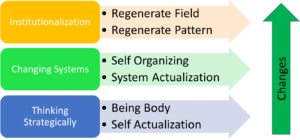Regenerative Economy
-
Module 01: Introduction1.1 Lesson-1: Interested in Regeneration?
-
1.2 Lesson-2: What is Regenerative Economy?
-
1.3 Lesson-3: Principles of Regenerative Economy9 Topics
-
1.3.1 Principle 1: Maintain strong, cross-scale circulation of key flows, such as energy, information, resources, and money.
-
1.3.2 Principle 2: Regenerative and sustained re-investment
-
1.3.3 Principles 3 & 4: Maintain Trustworthy Inputs and Healthy Outputs
-
1.3.4 Principle 5: Maintain a good balance between different types of organizations.
-
1.3.5 Principle 6: Maintain a balanced mix of resiliency and effectiveness.
-
1.3.6 Principle 7: Maintain sufficient diversity
-
1.3.7 Principle 8: Encourage cooperative relationships and principles that are shared by all
-
1.3.8 Principle 9: Encourage positive action and restrict speculative and overly extroverted behavior
-
Principle 10: Encourage efficient, flexible, group learning
-
1.3.1 Principle 1: Maintain strong, cross-scale circulation of key flows, such as energy, information, resources, and money.
-
1.4 Lesson-4: Towards Regenerative Economy1 Quiz
-
Module-02: Go Beyond the Circles2.1 Lesson-1: From Linear to Circular Economy
-
2.2 Lesson-2: The Nested System
-
2.3 Lesson-3: From Focusing on the Product to Focusing on the Process1 Quiz
-
Module-03: Regenerative Economy Mindset Shifting3.1 Lesson-1: Shift Mindset to Transform the System1 Topics
-
3.2 Lesson-2: Shift Mindset: ?Doing? to ?Being?2 Topics
-
3.3 Lesson-3: Shift Mindset: ?Ego? to ?Soul?1 Topics|1 Quiz
-
Module 04: Regenerative Economy Framework4.1 Lesson-1: Levels of Paradigm6 Topics
-
4.2 Lesson-2: Understanding Levels of Paradigm as a System
-
4.3 Lesson-3: Evolving a Practice of Regenerative Economics5 Topics
-
4.4 Lesson-4: Quantitative Growth to Qualitative Growth2 Topics|1 Quiz
-
Module 05: Collaborative Approach to Regenerative Economy5.1 Lesson-1: Ecology and Regenerative Economy 1
-
5.2 Lesson-2: Economy of Human Development9 Topics
-
5.3 Lesson-3: Regenerative Approach to Whole Economic Development7 Topics
-
5.3.1 Risks Associated with Traditional Economic Growth
-
5.3.2 A Regenerative Evolutionary Strategy to Creating Community Wealth
-
5.3.3 Developing Place-Sourced Community Intelligence: A Three-Phase Strategy
-
5.3.4 Phase One: Thinking Strategically
-
5.3.5 Phase Two: Changing Systems
-
5.3.6 Phase Three: Institutionalizing Strategic Planning Patterns and Fields
-
5.3.7 The Changes
-
5.3.1 Risks Associated with Traditional Economic Growth
-
5.4 Lesson-4: Regenerative Culture3 Topics|1 Quiz
-
Module 06: Regenerative Investment6.1 Lesson-1: The Role of Businesses2 Topics
-
6.2 Lesson-2: Investing from a Regenerative Mind1 Topics
-
6.3 Lesson-3: Food System Investing in a Regenerative Economy4 Topics|1 Quiz
-
Conclusion
5.3.3 Developing Place-Sourced Community Intelligence: A Three-Phase Strategy
?????????? 16, 2024
The regenerative development strategy is based on living systems thinking and employs systemic frameworks and ideas that community members can learn and put into practice. We employ a meta-framework to involve a community in a multi-year regenerative process. Our framework shows an ongoing learning method that allows a society to co-evolve including its environment. This systems change is supported by three overlapping phases of work: strategic thinking, driving systems change, and institutionalizing procedures and patterns. A community will experience a number of state changes during these three phases, allowing it to gradually increase its capacity for regeneration. The framework demonstrates the transition from self-actualizing to system-actualizing, in which people and groups shift their attention from maximizing their own wealth-generating potential to maximizing the wealth-generating power of systems that are greater than themselves.
This framework describes the effort that is required for a community to become capable of regenerating itself and its economy as an unique, self-reinforcing process. The simultaneous growth of inner and exterior capacities is necessary for each phase. Helping others see and develop their own potential?potential that can be articulated as a contribution towards something bigger than themselves?relates to inner work. It also has to do with enhancing their capacity for self-management so that their activities become more systemically efficient, strategic, and meaningful.
Helping individuals recognize the essence and innate potential of the biological systems they inhabit is part of outer work. In other words, it’s about teaching people a method to see their world as a dynamic, living system so they can make decisions that are actually advantageous for everyone who will be impacted.
By balancing one’s inner and outward labor, one may make sure that while one develops, they are also contributing to the health of the social and ecological systems around them, realizing that these systems are the foundation of both one’s current and future wealth. In fact, reaching one’s full potential as a person requires understanding how to deal with complicated systems. Because of this, the connection of self-actualization and system-actualization is emphasized in our strategy.


